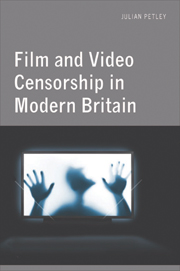Book contents
- Frontmatter
- Contents
- Acknowledgements
- Dedication
- Introduction
- Part I Censorious Rigmarole and Legalistic Overkill
- Part II After the Deluge
- Part III Nineties Nightmares
- 7 ‘Not Suitable for Home Viewing’
- 8 Vicious Drivel and Lazy Sluts
- 9 Doing Harm
- 10 The Anatomy of a Newspaper Campaign: Crash
- 11 The Last Battle, or Why Makin' Whoopee! Matters
- Part IV New Millennium, New Beginning?
- Appendix: The DPP List of ‘Video Nasties’
- Bibliography
- Index
10 - The Anatomy of a Newspaper Campaign: Crash
from Part III - Nineties Nightmares
Published online by Cambridge University Press: 05 August 2013
- Frontmatter
- Contents
- Acknowledgements
- Dedication
- Introduction
- Part I Censorious Rigmarole and Legalistic Overkill
- Part II After the Deluge
- Part III Nineties Nightmares
- 7 ‘Not Suitable for Home Viewing’
- 8 Vicious Drivel and Lazy Sluts
- 9 Doing Harm
- 10 The Anatomy of a Newspaper Campaign: Crash
- 11 The Last Battle, or Why Makin' Whoopee! Matters
- Part IV New Millennium, New Beginning?
- Appendix: The DPP List of ‘Video Nasties’
- Bibliography
- Index
Summary
The beginnings of the Crash furore lie entirely in a review of, or rather hysterical diatribe against, the film in the Evening Standard (3 June 1996) by Alexander Walker who had just seen it at Cannes. The piece is headed: ‘A Movie Beyond the Bounds of Depravity’, although this phrase appears nowhere in the text. It was, however, taken up in numerous subsequent articles, the first of which was the Mail's front-page story on 9 November, headed ‘Ban This Car Crash Sex Film’, which stated that Crash ‘has shocked critics, one of whom labelled it “beyond depravity”’. Walker's own reaction to having a Standard sub-editor's nifty turn of phrase attributed to him was typically slippery and ambivalent. He publicly denied, when challenged, that he was responsible for the words ‘beyond depravity’ (for example in a confrontation with the film's executive producer, Chris Auty, on the Radio 4 Today programme on 9 November) but, privately, told the Standard's editorial manager, Jeannette Arnold, who handled the paper's response to my complaint to the Press Complaints Commission (PCC) about the gross inaccuracies in Associated Newspapers' campaign against the film, that he considered the words to be ‘fair and accurate comment on the content of the article and the strength of opinion expressed’.
- Type
- Chapter
- Information
- Film and Video Censorship in Modern Britain , pp. 115 - 128Publisher: Edinburgh University PressPrint publication year: 2011

